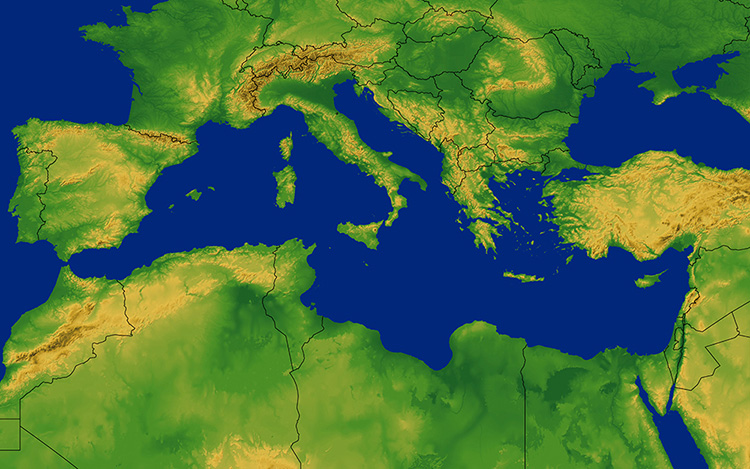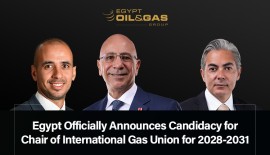The hydrocarbon resources of the Eastern Mediterranean region have greatly increased in importance in recent years. The new natural gas discoveries can have a significant impact on the politics of global energy security.
The new discoveries were also promoted as a tool to foster a new era of economic and political stability in the region.
However, competition over natural gas discoveries in the Eastern Mediterranean has combined with bitter regional rivalries to fuel tensions between energy-thirsty Turkey and its neighbors.
The dispute over natural gas discoveries has not only revived the long-standing disputes between Greece and Turkey over the partition of Cyprus and the Aegean Sea continental shelf, but it has also threatened to stoke tensions with other countries in the eastern Mediterranean basin and involve organizations such as the European Union (EU) and NATO.
The Turkish move to embark on a new round of exploration activity in the East Mediterranean last month asserted the Turkish expansionary policy and dampened expectations for a quick resolution of conflicting claims to potential natural gas resources in the region.
The Magnificent Find
The discovery of the supergiant Zohr gas field off Egypt in 2015 kick started interest in the region. The largest gas discovery ever made in the Mediterranean started production in December 2017, allowing Egypt to achieve self-sufficiency in natural gas and marked a new phase of exploration activities, leading to the discovery of other important fields in the country’s offshore waters.
However, Zohr was not the first significant discovery in the region as Israel struck reserves in 2009, followed by the larger Leviathan field in 2010, which slashed Israel’s reliance on highly polluting coal for electricity.
The significance of these discoveries can be clearer in light of the new change in the geo-economy of the production and consumption of energy in the past five years as natural gas tends to be a more dominant source of energy in terms of both supply and demand.
The International Energy Agency (IEA) expects global demand for natural gas to rise until 2040 as it represents a bridging fuel in the transition to decarbonized energy markets given its environmental advantages.
The new discoveries of natural gas resources in the eastern Mediterranean have even forged some unlikely alliances. The East Mediterranean Gas Forum (EMGF), which can be described as “the Organization of the Petroleum Exporting Countries (OPEC) of Mediterranean gas” was formally established this year.
The Cairo-based forum brings together Egypt, Israel, the Palestinian Authority, Jordan, Greece, Cyprus and Italy, with the aim of establishing the region as a major energy hub. France has asked to join, while the US has requested to become a permanent observer.
The geographical proximity between the Egyptian fields and other fields off the shores of Israel and Cyprus can provide a competitive regional gas-export infrastructure based on the Egyptian liquefied natural gas (LNG) export facilities.
For their part, Israel, Cyprus and Greece signed an inter-governmental agreement for the East Med gas pipeline that will run from Israel through Cyprus and Greece to Europe.
The discovery of natural gas has also led to a phenomenon of demarcation of the maritime areas in the region, with the multiplication of declarations of Exclusive Economic Zones (EEZs) by the producer states.
One common result of all these developments was the exclusion of Turkey from the eastern Mediterranean natural gas market as natural gas from the eastern Mediterranean can reach Europe, bypassing Turkey and Russia’s pipelines.
The Turkey-Shaped Elephant in The Room
Although there have been no big gas discoveries in Turkey’s part of the eastern Mediterranean, it has sent ships into the coastal waters of Cyprus to drill for natural gas.
In response, Cyprus and Greece issued an arrest warrant for any Turkish drill ships obstructing their operations, and the two countries have called on the EU to punish Turkey for its provocations.
Turkey and Greece have an old dispute over maritime boundaries as the Turkish coastline is dotted with Greek islands that Athens believes give Greece territorial rights that Ankara argues they violate its own maritime claims.
Ankara claims that islands should only have limited exclusive economic zones. However, Turkey’s stance is complicated by its refusal to sign the UN Convention on the Law of the Sea, which should be called on to resolve such disputes.
Rubbing Salt into Old Wounds
While gas exploration can be seen as the cause for the current tension, the roots of the problem seem to lie much deeper. It is also more than a revival of a long-standing conflict between Greece and Turkey. The current tension can be clearly seen in the context of the geo-strategic rivalry that pits President Recep Tayyip Erdogan’s Turkey against several other players in a battleground that extends from Libya across the waters of the Eastern Mediterranean to Syria and Iraq.
Turkey’s Islamist-based foreign policy under Erdogan has left Ankara’s ties with neighbors and allies in shambles.
Erdogan’s policies aimed at the Arab world following the Arab Spring, which were mostly concentrated on support for the Muslim Brotherhood, left him with no friends from Arab regimes except for Qatar, a country that suffers isolation too in its region.
These policies were also the reason for the strained relations between Cairo and Ankara that have been deteriorated since the ouster of former Islamist President Mohamed Morsi, who was a close ally of Erdogan.
The tensions between the two countries even escalated in the past months due to not only Ankara’s violation of the territorial waters of Greece and Cyprus, two close allies of Egypt, but also for its military intervention in war-torn Libya and its violation of Iraq’s sovereignty as well.
Conflict further heightened after Egypt and Greece signed a maritime demarcation deal in August establishing an exclusive economic zone between the two countries, sparking an angry response from Turkey.
Ankara deserved the same angry response from Cairo, EU and US after the signature of an illegal maritime border agreement between Turkey and Libyan Tripoli-based government last January.
The Turkish occupation of large swaths of Syria, engaging in regular strikes in northern Iraq, leading thousands of mercenaries in Libya, and supporting Muslim Brotherhood-linked politicians in Yemen, helped Ankara to lose more friends.
A Long List of Provocations
Many fear that the latest dispute in Eastern Mediterranean could lead to direct military confrontation between Turkey and Greece, as the two NATO members and their allies square up over control of the seas.
Such fears will just be added to a lengthy and complex list of problems Turkey has caused for NATO under the rule of Erdogan.
Turkey’s breaches of NATO principles also included equipping itself with Russian S-400 anti-aircraft batteries and conducting a strategy of ethnic cleansing to the Kurds in northern Syria, and supporting terrorist militias in Syria.
However, the transatlantic organization still draws a big question mark by failing to punish Turkey for any of these breaches and thus it is thought that the East Mediterranean crisis can in no way find a solution within NATO.
In the absence of clear US action to deter Erdogan, Germany has sought to mediate between Greece and Turkey, with France taking the side of the Greeks.
As Europe currently seems not to have a real strategy to contain Turkey, France emerges as a main opponent to Ankara not only in the eastern Mediterranean but also on Turkey’s NATO membership, migrants’ issue, and Libya. It has strongly supported initiatives by Egypt, Greece, and Cyprus against Turkey. France also asked to become a member of the EMGF and is going to sell military equipment to Greece.
A Conflict That No One Can Afford
Despite the high tensions in the region and the ongoing military build-ups, many analysts refute the idea that Turkey can really go to war. After all US and NATO cannot under any circumstances allow such conflict to happen between transatlantic allies.
However, a look inside Turkey can support another rhetoric that Turkey is using the issue in Eastern Mediterranean to offer a distraction from other domestic problems.
Perhaps Erdogan is striving to hide his difficulties in domestic politics, underlined by the loss of major cities and especially Istanbul during the 2019 municipal elections, as well as the weak economy indicators.
But what is at stake in the eastern Mediterranean cannot be left for the imprudent attitude of the self-styled sultan who uses blackmail to threaten the region’s geopolitical status quo that has governed the Mediterranean for decades. It is time for the world to make it clear to Turkey that it has to comply with the international law or risk exposing itself to more isolation and most likely painful sanctions.








